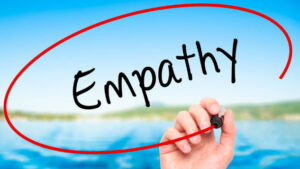
How does empathy make you a better leader?
When you think of someone who possesses empathy, do you assume they are a nice person or a good listener perhaps? Do you dismiss it as being one of those qualities that the HR Dept. has to worry about but you don’t?
Did you know that the single biggest complaint of Americans in the workforce is poor communication with their manager1?
Communication and empathy form the foundation of all relationship skills. So, it’s not surprising that people prefer to work with those they can relate to and who know how to successfully handle and communicate their emotions.
What exactly is empathy anyway?
Empathy is the ability to understand other people. It’s understanding what they say but also to accurately hear their unspoken thoughts, feelings and concerns. This includes their body language. Empathy requires self awareness. We need to be aware of, and sensitive to, our own feelings in order to be sensitive to those of others.
A client case study in empathy
My client, Daphne, is a research scientist with a PhD. She’s dedicated and focused until it comes to working with others. If they don’t see her point of view, or if they disagree with her, she discounts them as stupid and doesn’t do much to hide it. Before we began coaching, it never occurred to Daphne to take the time to understand her colleagues’ work or how it impacted hers and vice versa. She assumed they knew what she was doing and were purposefully sabotaging her.
When Daphne engaged with her colleagues, tried to see things from their perspective (which was often non-technical) and was open to asking for their opinions, things started to shift. She encouraged them to ask questions and practiced active listening. She stopped answering before the other person stopped talking.
As all of these new skills developed and improved, Daphne realized that her co-workers had valuable insights and had been put off by her hostile demeanor, body language and defensive stance. She also started engaging with them on a personal level.
If you’ve been told you aren’t empathetic, it’s doesn’t mean you’re not a nice person or a good person. But it does mean your success as a leader is likely to be significantly lower. A few things that might help you and that Daphne worked very hard to master and improve were:
- Stop talking and start listening. How many conversations do you dominate?
- Ask open ended questions like “Tell me how that has affected you?”
- Ask people to suggest their own solutions to a problem or challenge before giving them feedback.
- Be open to sharing your experiences with others, especially ones where you may have failed but gained invaluable lessons and expertise as a result.
- Take the time to learn about your employees or co-workers and their families.
Remember the #1 reason people leave their job is not their salary, their ability to get promoted, the number of stock options or the commute. It’s their direct supervisor. If you’re someone who’s managing people now or plan on doing so in the near future, you might want to consider how you score on the empathy scale. Click here to find out how you rate on the empathy scale. If you wonder how your score affects your leadership or your ability to work with others, let’s have a conversation about how you can develop this important skill.
